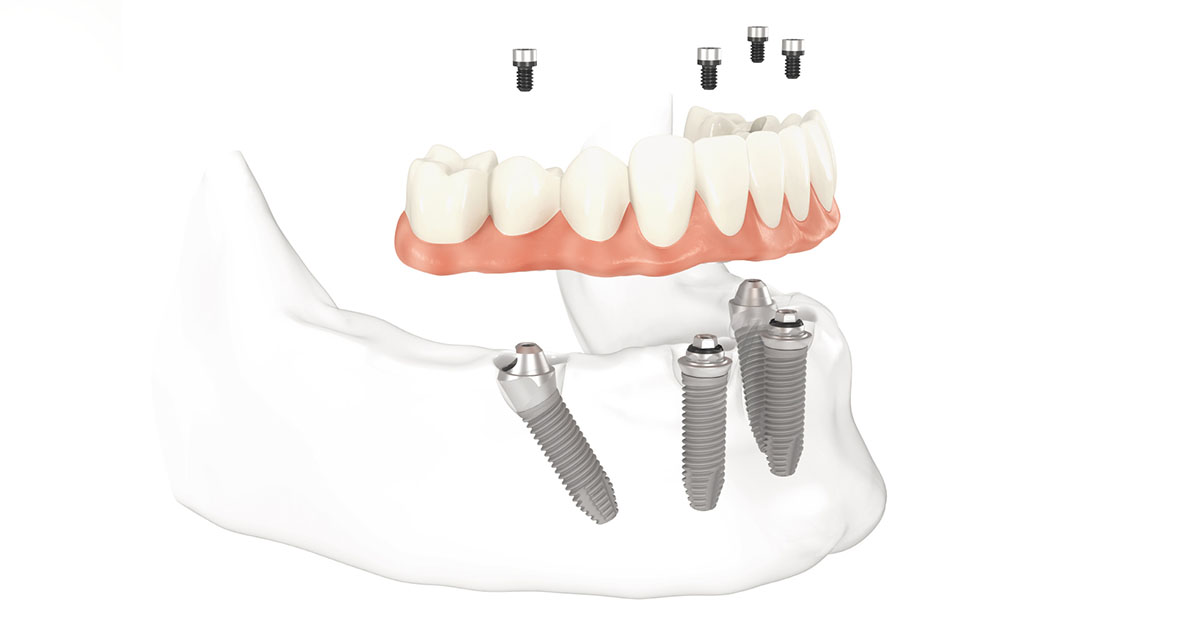
Are you contemplating the switch from traditional removable dentures to implant-supported alternatives like All-on-4 offered in our DC dental office? This transition can significantly improve comfort, stability, and even overall oral health. In this guide we’ll look into the process of switching to hybrid implant supported dentures such as All-on-4 as well as the reasons why people switch and the benefits they find.
Understanding Implant-Supported Dentures
Implant-supported dentures, like the All-on-4 solution offered at our dentist office, differ from conventional dentures since they are anchored to dental implants surgically inserted into the jawbone. These implants serve as robust anchors, providing enhanced stability and mitigating the common issue of bone loss associated with traditional dentures. This is in contrast to traditional dentures that rely on gravity, friction, and adhesives, often with varying degrees of success.
The Transition Process From Traditional Dentures to Implant Supported Ones
There are a few steps involved in switching from traditional dentures to hybrid dentures supported on four or more dental implants. Depending on the amount of bone loss that has happened over the years there may be an additional step of tissue augmentation, before or during implant placement.
- Consultation and Planning: The journey towards implant-supported dentures begins with a comprehensive dental examination and consultation. During this stage, oral health is evaluated, expectations are set, and the dentist will determine if you are a candidate for dental implants. Some people are not candidates for dental implants and will not be able to undergo the procedure for implant-supported dentures.
- Surgical Procedure: Once you and the dentist agree on a treatment plan you will come in for another appointment for the implant surgery. The dentist will place four or more dental implants into the jaw depending on how many area needed for stability. Depending on the treatment plan, the dentist may even place a temporary acrylic denture so you walk out of the office with a new smile.
- Healing and Osseointegration: Following implant placement, a crucial period of healing ensues, during which osseointegration occurs. This process involves the fusion of implants with the jawbone, establishing a solid foundation for the dentures. During this time expect to eat soft food, especially in the first couple of weeks after surgery.
- Final Fitting: While osseointegration is taking place, custom-made dentures are meticulously crafted from porcelain to match the natural aesthetics of your teeth. Once the implants are fully integrated into the bone, you will come in for the final placement of the dentures.
- Aftercare and Maintenance: Maintaining implant-supported dentures necessitates regular dental check-ups and adherence to proper oral hygiene practices. Consistent care prolongs the lifespan of your dentures and promotes overall oral health. The implants are expected to last for a lifetime with proper care.
The Advantages of Implant-Supported Dentures
Here are some of the benefits that patients report from getting hybrid dentures such as All-on-4.
- Enhanced Confidence: Implant-supported dentures offer superior stability compared to traditional alternatives, alleviating instilling confidence in social interactions. Patients no longer need to worry about teeth slipping or moving around in their mouth while talking or chewing.
- Increased Comfort: Even the most comfortable traditional denture is going to be bulkier than an implant supported one since the denture relies on a wide base to rest on the gums. Implant-supported dentures, on the other hand, have a much narrower profile and feel less bulky.
- Improved Functionality: With enhanced stability, individuals can enjoy a wider range of foods and articulate speech with greater clarity, free from concerns about denture slippage.
- Preservation of Jawbone Integrity: Dental implants stimulate the jawbone, mitigating the risk of bone loss that often accompanies traditional dentures. This preservation of jawbone integrity contributes to long-term oral health and facial structure.
- Convenience: Unlike traditional dentures, implant-supported alternatives require no special care or removal for cleaning, simplifying maintenance and enhancing convenience. You won’t lose the dentures or have a dog chew on your dentures since they are always right where you left them, in your mouth.
Considering the Transition Hybrid Dentures: What’s Next?
If live in or near DC and contemplating the transition to implant-supported dentures, our dentists would love to see you for a consultations. Our dentists possess expertise in crafting dental prostheses tailored to your unique needs, ensuring a seamless transition and optimal outcomes.
Take the first step towards enhanced oral health and regain confidence in your smile. Explore the possibilities of implant-supported dentures and embark on a journey towards a brighter, more comfortable future.

